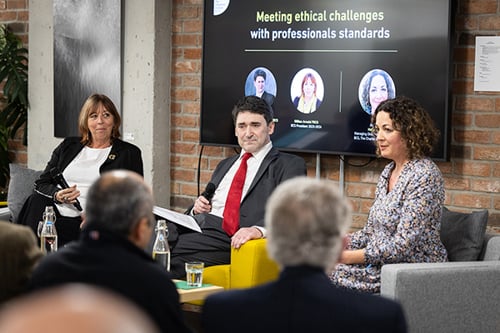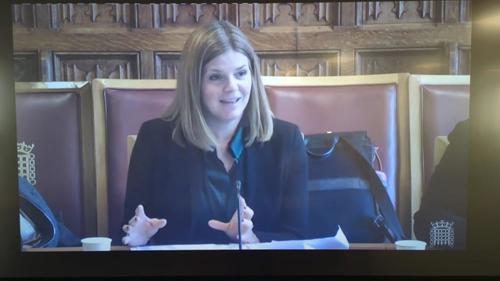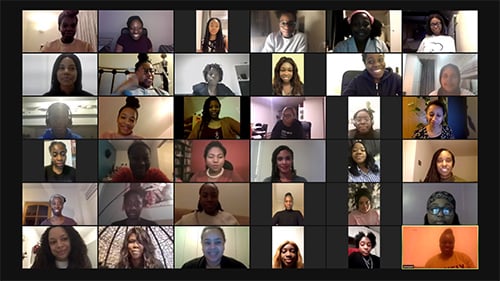Tech Policy recommendations for the new government 2024.
Technology will underpin everything the new Prime Minister, Sir Keir Starmer, and the new government hope to deliver from boosting the economy, cutting hospital waiting lists through to achieving net zero.
For the first time, an incoming government must plan for the impact of AI and other high stakes technologies. The Post Office Horizon IT scandal showed the cost of systemic failure to meet the highest standards of accountability and responsibility in how computing is used.
In the lead up to the General Election, we asked all the major political parties to put aspirational goals for computing and digital technologies in their programmes for government so the lives of every person in the UK, and our economy could benefit from IT.
If the people making decisions about technology are focussed on ethics, education, and equity, it will be the key to closing the aspiration gap and realising dreams.
As the professional body for computing, BCS believes that:
- Anyone with a significant role in information technology should prove their accountability by being professionally registered. This includes leaders who use technology in critical national infrastructure like health, defence and other public services.
In practice, that commitment means becoming Chartered, just as we expect for accountants or engineers.
- Every child and adult deserves access to a world class computing and digital literacy education. The digital divide is a modern measure of inequality that the next government must address for the UK to remain globally competitive.
- Closing the gender gap in information technology can solve many of its issues around trust, bias and safety – over 500,000 women are ‘missing’ from the profession. Thousands of people aged 50 and over, and people with disabilities, are also under-represented in the digital sector. This matters because we will only create systems that work for everyone in society if they are created by teams that reflect all of society.
If politicians act on these priorities, the UK will harness the power of emerging technologies like AI and quantum computing, safely, sustainably and responsibly, opening up opportunities for every part of the UK.
The details:
ONE: Technology professionals should be Chartered to build public trust
The UK needs its information technology sector to be responsible to its citizens.
UK information technology professionals (including leaders who makes decisions about technology should):
- Be professionally registered – everyone with the potential to do so should be supported to achieve Chartered IT Professional (CITP) status.
- That means being held to independent standards of ethics, competence and accountability.
Board level decisions on the deployment of tech, including AI, must be informed by IT professionals. Risks and opportunities are missed when this is not the case.

Organisations should be required to publish safe, ethical and inclusive policies on their use of technology (including AI) in any relevant systems.
IT professionals should feel supported to access safe whistleblowing channels to call out unethical practice.
An annual Statement of Ethical IT, similar to current declarations under the Modern Slavery Act, would provide the transparency the public deserves and clarity for industry and international partners.
TWO: Every child deserves a computing and digital literacy qualification
Teaching computing in schools is vital to the UK’s competitiveness on the world stage and to every child’s future. We know parents believe this too.
Yet - most teenagers drop computing aged 14, just when they should be learning the skills for life and work.
Alongside the Computer Science GCSE we need:
- An applied computing GCSE - this should teach practical ways in which computing can be used safely and responsibly in society and business, rather than focus on theory.
- A broad digital literacy qualification, available to everyone.
An understanding of the principles of AI, its benefits and limitations should be taught to children from the age of 11.
These plans are already backed by the House of Lords 11-16 Education Committee (Dec 2023).

To help teachers deliver this, we need to make sure digital skills including AI are part of their training qualifications and that includes headteachers.
For you
Be part of something bigger, join BCS, The Chartered Institute for IT.
The new government must also continue to support digital apprenticeships and professional development qualifications for all adults to ensure world-leading skills across the UK workforce.
Computing education is the route to closing the digital divide long-term and forever.
THREE: We can’t wait 300 years to close the gender gap in technology
It could take over 280 years to close the gender gap amongst IT professionals if current trends are not disrupted, according to our analysis of ONS data.
Only 20% of the IT sector is female – in fact over 500,000 women are ‘missing’ from the UK IT workplace who should be there.
And 94% of girls (and most boys) drop computing in school as soon as they are allowed to, as shown in our analysis of government data.
What’s the problem?
- The gender gap begins very early in schools
- A long-term lack of understanding of how many careers driven by ‘IT’
- Flexible working options await the impact of new legislation
- A prevalent ‘tech-bro’ culture and micro-aggressions, as shown by BCS’ report with Coding Black Females.
But - the gap between men and women in tech is far from the only diversity challenge for technology:
Black women, people with disabilities, and people aged over 50 are also severely under-represented in IT.

We need to bring the talents of all these ‘missing’ people into emerging fields like AI and quantum to ensure we have safe, responsible outcomes for all computing systems that make decisions about our lives.
Priorities in key fields:
Joint approach needed to navigate the opportunities and challenges of AI - We believe AI won't grow up like the Terminator, and we recommend a collaborative effort between the government, industry, and society to navigate AI's challenges and harness its potential for societal benefit.
Take cybersecurity seriously - Strengthening government policy, organisational culture and professional standards in cybersecurity will protect society, the UK economy, and our competitiveness and credibility as a global partner.
Design Sustainable tech to achieve net zero - We welcome the Labour Party's manifesto pledge to remove planning barriers to new data centres to cope with the increased demands from emerging technologies such as AI. We also urge that data centres are designed to be sustainable and energy efficient.
Develop a long-term plan for the digital transformation of health and care - A long-term government digital transformation plan for the health and care sector is essential. Technology can help reduce waiting lists by streamlining administrative processes and improving diagnosis, but it needs investment in people, processes, and technology.
Build on the successes of digital apprenticeships - As digital transformation accelerates, a skilled workforce is vital to the economy. We ask the government to protect the quality and integrity of digital apprenticeships and take proactive steps to build on their success.
About the BCS Manifesto
The BCS policy recommendations and themes were reviewed and shaped by BCS’ Fellows Technical Advisory Group (F-TAG), the BCS’ Influence Board, and our specialist members’ groups, alongside the BCS’ Executive team and the Policy and PR team. The research underpinning this work is based on long-term consultations and analysis including existing data sets, BCS members surveys, YouGov polling and working with external stakeholders.
For more information please email policyhub@bcs.uk












